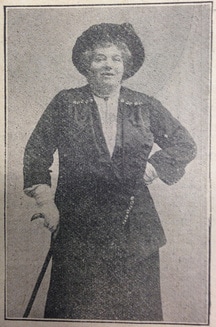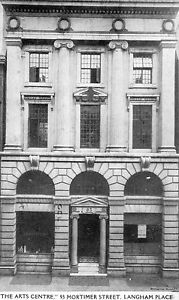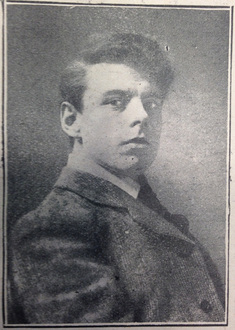|
As ticket prices go ever up in the West End - especially for shows designed to appeal to the widest audiences - and more schools are cutting Drama 'A' levels, the opportunity to see, experience and be inspired by large scale theatre lessens. I've been researching AFL member Nancy Price and her People's National Theatre in the 1930s and 1940s. However one of her fellow suffragist actresses had hoped to develop a similar idea twenty years earlier... In 1913 Rosina Filippi (who by that point was mostly retired and worked as a voice and acting teacher) wanted to start a People's Theatre - it would cost no more to go there than to go to the cinema, produce "fine plays both classical and modern" and be a combination of a "foreign Conservatoire" and a Repertory Theatre. The drama school would be free and the rep company would use actors from the school. She thought that an actress needed five years of training and an actor seven years at least. Ideally, the People's Theatre was to be built in Chelsea and seat about 1500 people... One teeny snag...with no such thing as a government grant even a possibility, it would have to be funded privately. "Unlike the cinema theatre, however, my project is not...intended to be a money-making concern. It will merely pay its way and be in the nature of a Mental Hospital, endowed and subsidised by voluntary contributions" She wanted to look after the "physical and mental well-being of people" and to give them something artistically beautiful and affordable to feed their souls - and if the rich supported hospitals and good causes, why shouldn't they support theatres for philanthropic reasons? Citing a similar theatre project in Milan as her inspiration, Filippi organised a lecture tour in London and the provinces to drum up public support for her idea - and she gave her first lecture on 27th October 1913 at the Arts Centre on Mortimer Street. As it happens, the Actresses' Franchise League, keen as they were to appeal to and be accessible to all, were often to be found at the Arts Centre in 1913-14, holding meetings and performing new suffrage plays. "Miss Filippi had a word to say about the present-day theatre. She declared that it was fast loosing its hold on the public... Now actors would be men of business as well as men of art, and this led to a chaotic state of affairs. Her idea was to present to the public actors of individuality..." The founder and director of the Arts Centre in Mortimer Street was certainly an individual. Mr. St. John Joyner was passionate about the Arts and strongly believed they were important and necessity for society - and that very often society took them for granted: "What kind of life would this be... without the assistance of the Arts? We take everything for granted. Corner a City man, for example, and ask him to give you as courteous and plain an answer as possible to the question 'Do you realise that your business, even your office itself, depends mainly on several of the Arts?'... and if you have the courage to continue, ask him where his wall-papers come from, where the colour-scheme of his office came from... his beautiful furniture (which help to impress his clients, to the advantage of his business); that engraving which he is so fond of... the music that makes the dinner-hour a pleasant change in the day; the picture papers that enable him to realise the actualities of life; the posters, the picture postcards even, that lend a little colour to the grey of things... and so on ad infinitum" Joyner partly blamed some artists themselves for alienating the general public by being affected, superior and presenting "themselves to their fellow-creatures as eccentric beings." He wanted people to see the Arts as having value in their everyday lives and as being part of a "true education." He wanted no one medium to be considered better than another - for him, all of the Arts were equal. I can imagine that he would have supported the idea of a People's Theatre. So - what of Rosina Filippi and her plans? In 1914 Lilian Baylis gave her a chance at the Old Vic. There was a brief season of Merchant, R&J and School for Scandal - but it wasn't repeated. It is arguable that it helped develop Baylis's interest in the possibilities of a Shakespeare company at the Vic though. I've written about Filippi before - see my blog post on acting and audibility "The Importance of Ella Kew-Shun" - and her book "Hints to Speakers and Players" (1911) is well worth a read if you can get a copy... or you could read it for free online here. I haven't found a mention in that book of why she thought actors needed two years more training than actresses... if you find out or have any ideas then please do comment here!
0 Comments
Leave a Reply. |
NaomiThoughts, reflections, bits of research Archives
April 2023
Categories
All
|



 RSS Feed
RSS Feed